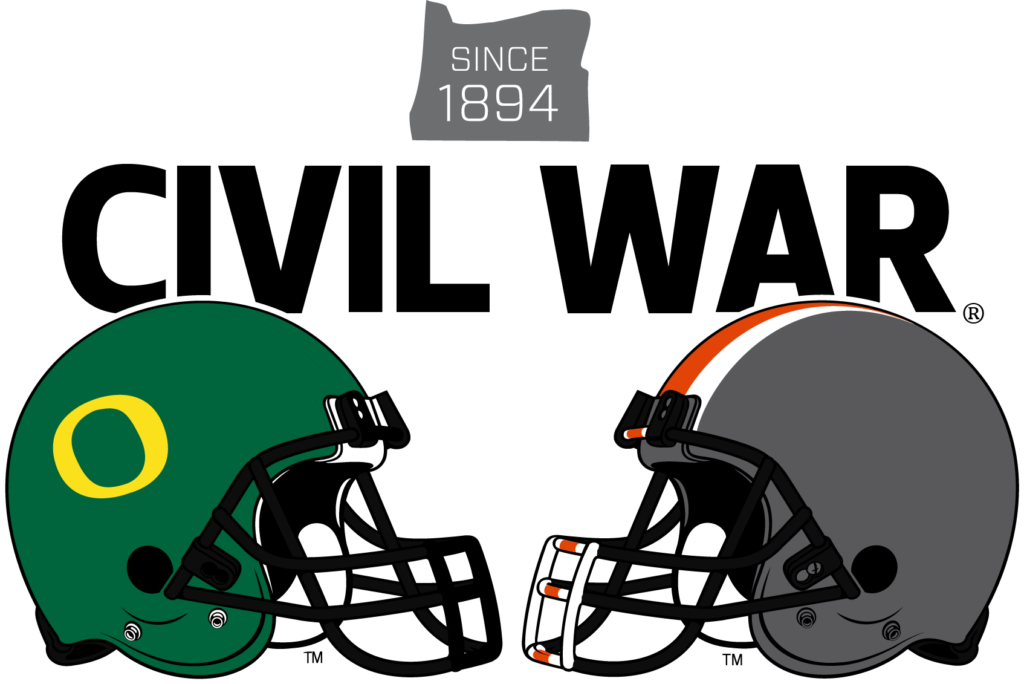Ad Disclosure
Oregon vs. Oregon State Will No Longer Be Known as the “Civil War”

There are a lot of college football rivalry games with fantastic names.
You’ve got the Iron Bowl, the Backyard Brawl, and the Holy War. Bedlam is another good one, along with the Border War and Battle for the Iron Skillet.
I was always partial to the “Civil War” between Oregon and Oregon State, but that’s now being axed for good, another casualty of the social justice wave sweeping the country in the wake of George Floyd’s murder:
Oregon & Oregon State mutually agree to no longer refer to Oregon-Oregon State rivalry games as the “Civil War”
— Brett McMurphy (@Brett_McMurphy) June 26, 2020
Both schools issued statements on the matter.
Here’s what the University of Oregon says, in part:
“Today’s announcement is not only right but is a long time coming, and I wish to thank former Duck great Dennis Dixon for raising the question and being the catalyst for change,” said Oregon Director of Athletics Rob Mullens. “Thanks also to our current student-athletes for their leadership and input during this process. We must all recognize the power of words and the symbolism associated with the Civil War. This mutual decision is in the best interests of both schools, and I would like to thank Scott Barnes for his diligence as we worked through this process. We look forward to our continued and fierce in-state rivalry with Oregon State in all sports.”
“I want to acknowledge and thank the current and former student-athletes who raised concerns about the historic name of the rivalry games played between our two institutions,” UO President Michael H. Schill said. “We need to make this change to align the words and symbols we use around athletic endeavors with our shared campus values of equity and inclusivity. While the name of our annual game might change, it will absolutely continue to be one of the great rivalries in college sports.”
And Oregon State released a statement containing this relevant passage.
“Changing this name is overdue as it represents a connection to a war fought to perpetuate slavery,” said OSU President Ed Ray. “While not intended as reference to the actual Civil War, OSU sports competition should not provide any misconstrued reference to this divisive episode in American history. That we did not act before to change the name was a mistake. We do so now, along with other important actions to advance equal opportunity and justice for all and in recognition that Black Lives Matter.”
“A number of student-athletes, alumni and friends of Oregon State University have questioned the use of the term Civil War in our rivalry series in recent years,” said Beaver Vice President and Director of Athletics Scott Barnes. “We initiated discussions with our Student-Athlete Advisory Committee (SAAC) about the possibility of eliminating the name “Civil War” from our series and with their leadership, we are moving forward.
For starters, I think it’s worth mentioning that a “civil war” is defined generically as a conflict between citizens of the same country. There were tons of “civil wars” that are not the American Civil War and do not have any connection to slavery or the Confederacy. The recent conflict in Syria is a civil war. The Rhodesian Bush War was a civil war.
Second, we’re talking about teams located in the Pacific Northwest, not the Southeast. Oregon became a state in 1859, right before the war, and was hardly a blip on the radar. A grand total of zero Civil War battles were fought in Oregon. The decision to drop the “Civil War” nickname might make more sense if Eugene was Gettysburg and Corvallis was Sharpsburg, but alas, they are not.
(Some people will point out that Oregon has a poor history of race relations, and that’s true – the territory did have black exclusion laws that were put in place prior to statehood. That’s a separate issue entirely, however, and isn’t the reason cited for getting rid of the “Civil War” nickname.)
Third – does it really matter? Should anybody truly give a shit about a nickname?
No, probably not, but this is yet another example of how we’re on a slippery slope, with no end in sight. We’re only making changes to appease the social media mob, without taking a step back and trying to think critically or ask ourselves whether these cancellations and name changes are even necessary.
The part that jumps out to me is in the Oregon State announcement on the matter:
“While not intended as reference to the actual Civil War, OSU sports competition should not provide any misconstrued reference to this divisive episode in American history.”
When somebody “misconstrues” something, it’s typically their problem, not yours, unless you’ve presented the item in question in a poor or vague fashion. The aggravating thing is that we’re living in a world where people are attacking and defending statues they know absolutely nothing about, because action precedes thought. That considered, I guess we shouldn’t be surprised that people might be offended by a college sports rivalry nickname that has nothing to do with a conflict staged 2,700 miles away, which took place more than 150 years ago.
Time’s yours.
Kevin has been writing about Philadelphia sports since 2009. He spent seven years in the CBS 3 sports department and started with the Union during the team's 2010 inaugural season. He went to the academic powerhouses of Boyertown High School and West Virginia University. email - k.kinkead@sportradar.com